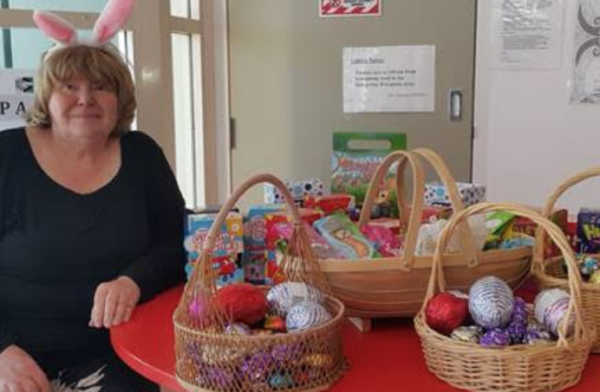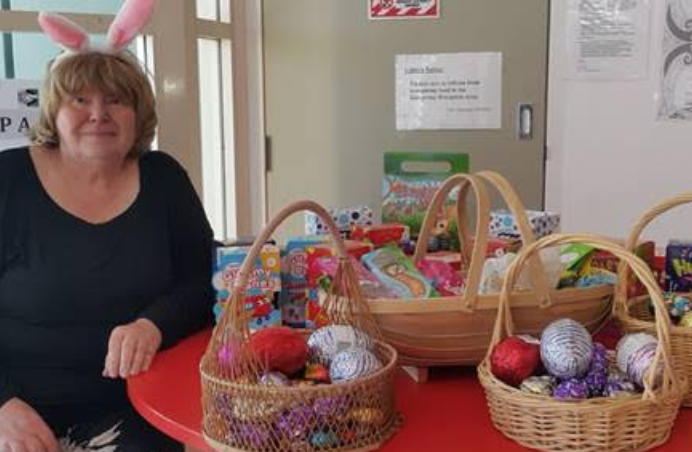
In my role as the Easter bunny, I was in Christchurch Men’s and Women’s prisons (not at quite the same time) giving out Easter Eggs over the weekend.
Pillars, the 2019 New Zealand Community of the Year, and the loved organisation of which I am President (and chief Santa/Bunny), is given oodles of chocolate eggs each year to distribute to the children. Not to mention the bounteous Christmas presents that start arriving each December. People are wonderful.
For the past five years I have spent weekends at the prisons giving out these great gifts. There are fabulous rewards in being a volunteer, and getting love and cuddles (or just a smile) from the children is very important.
Some – most really – we only see once or twice. Others have been friends over many years. Take John, his wife and numerous sons. They are a wonderful family. The children are warm and very respectful. There is a baby on the way, and the Easter bunny thinks it might be a girl. This family visit the grandfather, who is serving a long sentence and still has a while to go. I always load them up with gifts, and this year they were not short of chocolate eggs.
There is, however, a strong view among many in the community that children have no place in the prison environment. I come across it all the time. People disapprove of my volunteer stint. “They shouldn’t be going there”, people say, often with a darkling look.
This view is not confined to people on the right of politics. Some of the readers of this column might agree, despite being progressive on many issues. What do you really think?
Really, for answers to this, we need to turn to two sources: research evidence and the views of children themselves. Research on this question is very, very, clear. Children with loved parents in prison fret and worry about them, even to the extent of damaging their own health and education outcomes. Prison visiting somewhat relieves this anxiety.
Opportunities to interact in a normal manner with imprisoned parents allow children to come to terms with the separation and plan a future life with their loved parent. Lord Farmer, in a UK report noted that family involvement improved behaviour in prisons and increased opportunities for rehabilitation, making recidivism much less likely. He called it the ‘golden thread’.
There have been a number of books written by children with parents in prison. They are all very clear that love and caring does not end when a parent is incarcerated. Regular visiting provides for the maintenance of relationships and supports the whole family through the sentence.
Children are often called the ‘collateral convicts’, serving a sentence even though they have never committed a crime. The work of Pillars and other organisations to support the children visiting their parent in prison (along with all the other work that agency does) helps to mitigate the difficulties these children face in their lives. Chocolate eggs are not a solution to anything but are an affirmation of support.
Good visiting is important. Pillars runs Family Pathway Centres in a couple of prisons (and wants to extend them to more). These
Prison visiting is also not enough. We need to be much more ambitious in supporting families affected by parental incarceration. While the Pillars Family Pathway Centres encourage activities between prisoner and children, other visiting centres require the prisoner to sit unmoving in a seat for the entire duration of the visit.
The reasons for the differences between prisons in such practices is not clear. Reasons cited are always security needs or the potential for transfer of illicit goods, but such things can always be controlled in other ways.
I think that there is quite a bit of the ‘children should not be here’ mindset behind some of the visiting rules in place in some prisons. I would like to see all prison visiting spaces meet some minimum requirements in relation to parenting, including the right for prisoners to interact with their children.
I think change is on the way in relation to child visiting practices, and perhaps in relation to the wider aims of family-friendly prisons. I believe that it is a children’s rights issue, and that we need to become compliant with the United National Convention of the Rights of the Child. Such compliance will require major changes in the way that prisons view and treat children.
Dr Liz Gordon began her working life as a university lecturer at Massey and the Canterbury universities. She spent six years as an Alliance MP, before starting her own research company, Pukeko Research. Her work is in the fields of justice, law, education and sociology (poverty and inequality). She is the president of Pillars, a charity that works for the children of prisoners, a prison volunteer, and is on the board of several other organisations. Her mission is to see New Zealand freed from the shackles of neo-liberalism before she dies (hopefully well before!).






Arghh…. sorry about the typos. Was multi-tasking (badly)
I know the feeling, Liz…
Good on you Liz. Years ago I spent a couple of weeks in the Christchurch women’s prison, making a TV doco. As a guy, I had all kinds of preconceptions about the sort of people I’d encounter there – i.e. battle-hardened crims.
The reality was completely different. Yes, there were some really tough types, murderers etc, but the majority were just ordinary women who’d gone off the rails.
One example was a young Californian surfer who’d been persuaded to bring a parcel of drugs through Customs. Stupid, yes, but probably not evil.
I came away feeling strongly that the more we can treat them and their families as the real people they are, the better it will be for society as a whole.
Well done Liz, and well said. Children connecting with parents is so crucial for the kids that it’s a crying shame it’s a contentious issue.
We’ve taken so many wrong turnings here, and need to be listening to little ears more, not policy wonks.
Cheers
Really excellent thing to do Liz, such small kindnesses often get big results.
I am really proud of you Liz and your commitment to the children who are also serving a prison sentence with parents inside.
There needs to be a different approach around support for everyone involved during an incarceration which does not end when the prisoner is released in fact this is when it is needed most.
I think collateral convicts is a very apt description and should be addressed as part of a re think on children’s rights and how better to manage their participation including making the child play a part in the rehabilitation going forward.
It would be great too see you back in the political process , perhaps in a new party of the left that can fight this neo liberal stranglehold and address issues like collateral convicts and economic victims who are suffering under ” market ” policies.
very good to read this Liz. It is hopeful and positive when things can look pretty bleak. The harsh impact on the children of incarceration of their loved parents is largely invisible. Any thing that can ease this is a bright light- thankyou
Love the blog and Easter is always a great time to connect with the children visiting their parent. Of course this cause is very dear to my heart. It is such a pleasure working with you on changing the landscape for New Zealand’s most vulnerable children. Blessings from me.
Hi Liz,
Hats off to you for this important work and being a part of the answer. Together, we can build upon this endeavor. Keep doing what you do. I hope to see you at the conference this year.
And some kids have to work during their holidays, as their small business operating lawn-mowing contractor father, acting illegally, wants his son to help him get his work made easier:
https://nzsocialjusticeblog2013.wordpress.com/2018/03/13/child-labour-in-new-zealand-not-only-a-thing-of-the-past-although-not-widespread-alive-and-well-in-nz-in-2018-special-post/
He should face a stiff fine, and warning, but nothing has happened as it seems, perhaps because being a poor immigrant he gets special treatment in a tolerant way.
Perhaps he should spend a short stint in prison, for exploiting his child? Then his son can visit him with Easter eggs.
I really disagree with your comment. I have read the article and followups and seen the pics. Chinese cultures encourages kids from a young age to be involved in family chores and responsibilities. Something we are pretty hopeless at in the main. The children at a place not far from me that had a market garden all worked in that market garden and the old grandma at 80 did also.
I get a little tired of hearing kids say ‘why should I have to do the dishes…. ‘ very tedious, my own 6 kids did not say that it was a given that we all did this job together.
As a kid from about 7 years on, I worked in my parents garden every Saturday from 8am until mid afternoon. We both eat the produce and sold it. My brothers worked in the glasshouses from age 13 to pay for their school uniforms amongst other things.
Did it hurt me no, it taught me a great deal and I enjoy working hard to this day (70 this year).
You don’t actually know whether this kid is 11 or not, you are making far too many assumptions. Maybe the use of machinery is a separate issue. Perhaps they are trying to get sufficient money together to buy a house.
Children working with a motorised lawnmower is ILLEGAL, period.
IF you allow child labour that would be illegal, then others will also break the law, as it is unfair competition.
Shut up Marc.
Asian families and others have children who work as part of the family – always have had.
Do you really think the anglo-saxon ancestors who lived off the land and supported richer people too, had kids that sat around all day watching television ? Did the cow milk itself and eggs lay by the back door, and hay form itself into picturesque stacks, and cream into butter packs ?
How about calling the cattle home across the sands and getting downed instead ?
My ma had a list of jobs mounted on a chart and ticked off every Saturday morning when completed. Ghastly stuff like polishing brass, and cutting lawns, vacuuming – I hit Ma’s leg with the vacuum cleaner when I was 4 years old and she moaned and sat down, then she went into hospital and had a baby and I thought that I’d done it.
Families come in all shapes and sizes, and so do children, and citing one family as you have done doesn’t work, because one size doesn’t fit all Marc, and that kid may be playing a vital role in that family, and he may be proud, of it and if you want to punish the poor buggers then get yourself a law degree and become a judge or join some wacko religious sect.
Letting a young child work in a business with a lawn mower is ILLEGAL, dear friend, it is ILLEGAL. I didn’t make the law.
Comments are closed.